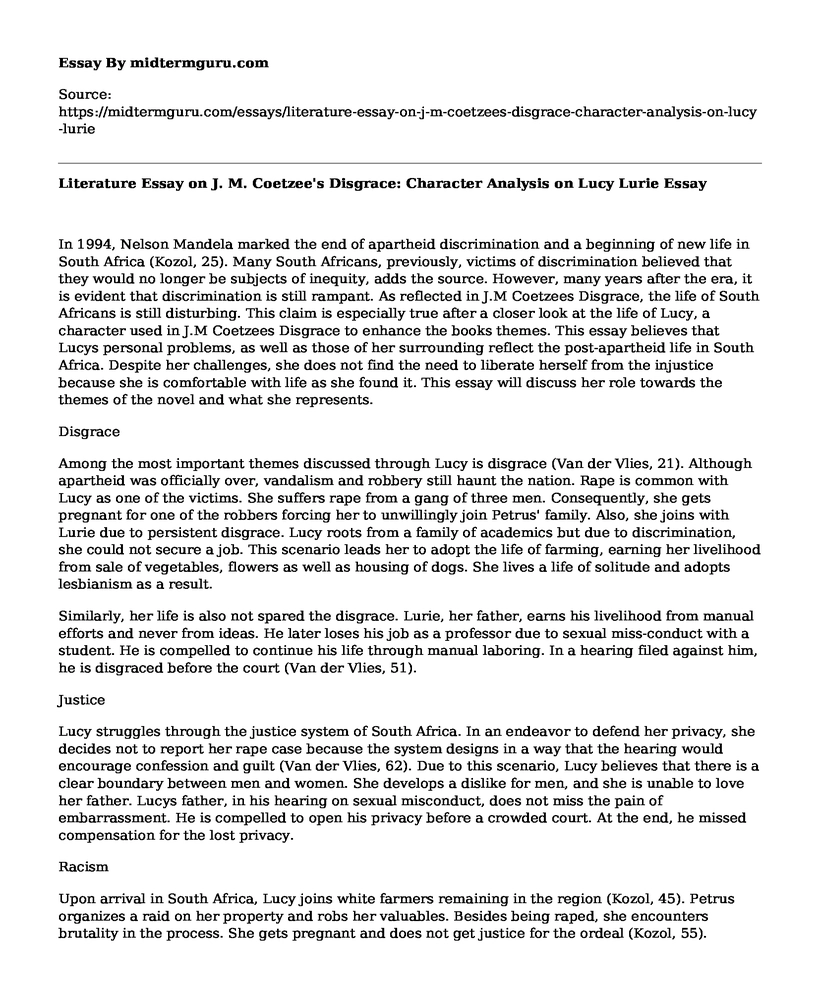In 1994, Nelson Mandela marked the end of apartheid discrimination and a beginning of new life in South Africa (Kozol, 25). Many South Africans, previously, victims of discrimination believed that they would no longer be subjects of inequity, adds the source. However, many years after the era, it is evident that discrimination is still rampant. As reflected in J.M Coetzees Disgrace, the life of South Africans is still disturbing. This claim is especially true after a closer look at the life of Lucy, a character used in J.M Coetzees Disgrace to enhance the books themes. This essay believes that Lucys personal problems, as well as those of her surrounding reflect the post-apartheid life in South Africa. Despite her challenges, she does not find the need to liberate herself from the injustice because she is comfortable with life as she found it. This essay will discuss her role towards the themes of the novel and what she represents.
Disgrace
Among the most important themes discussed through Lucy is disgrace (Van der Vlies, 21). Although apartheid was officially over, vandalism and robbery still haunt the nation. Rape is common with Lucy as one of the victims. She suffers rape from a gang of three men. Consequently, she gets pregnant for one of the robbers forcing her to unwillingly join Petrus' family. Also, she joins with Lurie due to persistent disgrace. Lucy roots from a family of academics but due to discrimination, she could not secure a job. This scenario leads her to adopt the life of farming, earning her livelihood from sale of vegetables, flowers as well as housing of dogs. She lives a life of solitude and adopts lesbianism as a result.
Similarly, her life is also not spared the disgrace. Lurie, her father, earns his livelihood from manual efforts and never from ideas. He later loses his job as a professor due to sexual miss-conduct with a student. He is compelled to continue his life through manual laboring. In a hearing filed against him, he is disgraced before the court (Van der Vlies, 51).
Justice
Lucy struggles through the justice system of South Africa. In an endeavor to defend her privacy, she decides not to report her rape case because the system designs in a way that the hearing would encourage confession and guilt (Van der Vlies, 62). Due to this scenario, Lucy believes that there is a clear boundary between men and women. She develops a dislike for men, and she is unable to love her father. Lucys father, in his hearing on sexual misconduct, does not miss the pain of embarrassment. He is compelled to open his privacy before a crowded court. At the end, he missed compensation for the lost privacy.
Racism
Upon arrival in South Africa, Lucy joins white farmers remaining in the region (Kozol, 45). Petrus organizes a raid on her property and robs her valuables. Besides being raped, she encounters brutality in the process. She gets pregnant and does not get justice for the ordeal (Kozol, 55).
Summary
Conclusively, it is true that Lucy finds it easier to live in the situation of a post-apartheid South Africa rather than try to change it. This essay establishes that she effectively reinforces the themes of the novel, more so justice and disgrace. Precisely, she indicates that post-apartheid South Africans are raped, robbed of their jobs, vandalized and most disturbingly, denied justice. Additionally, the difficulties of Lucys life represents the effects of racism. Because she was white, her home was raided and robbed by locals.
Works Cited
Van der Vlies, Andrew. J.M. Coetzee's Disgrace. 1st ed. London: Continuum, 2010. Print.
Kozol, Jonathan. The Shame Of The Nation. 1st ed. New York: Crown Publishers, 2005. Print.
Cite this page
Literature Essay on J. M. Coetzee's Disgrace: Character Analysis on Lucy Lurie. (2021, Jun 02). Retrieved from https://midtermguru.com/essays/literature-essay-on-j-m-coetzees-disgrace-character-analysis-on-lucy-lurie
If you are the original author of this essay and no longer wish to have it published on the midtermguru.com website, please click below to request its removal:
- Comparison of Two Heroes: Gilgamesh and Odyssey
- Literature Essay on the Use of Symbols by John Updike
- Essay on Time Stands Still By Donald Marguiles
- Hamlet Close Reading Essay
- Literary Analysis Essay on Naivety in "A&P" by John Updike
- Movie Analysis Essay on Hamlet by David Tennant
- Character Analysis Essay on Odysseus as an Epic Hero







